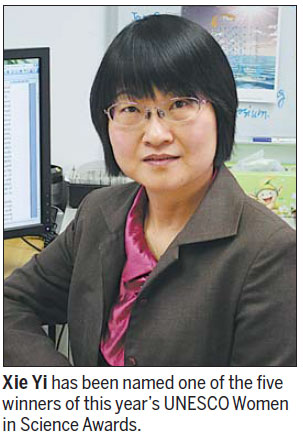UNESCO honors Chinese chemist and professor with science award for women
A Chinese scientist has been named one of the five winners of this year's UNESCO Women inScience Awards for her work on nanomaterials.
The awards, sponsored by the French cosmetics company L'Oreal, were presented in Paris onMarch 18.
Each of the five winners represented a region, with Xie Yi earning honors in the Asia-Pacific.The other winners were: Thaisa Storchi Bergmann of Brazil, representing Latin America; CarolRobinson of Britain, Europe; Molly Shoichet of Canada, North America; and Cherkaoui ElMoursli of Morocco, Africa and the Arab states.
The awards are presented to outstanding women scientists "for their groundbreakingdiscoveries in the physical sciences".
"Each of these women is a brilliant example of scientific excellence," a UNESCO statementsaid. "They prove every day that women can greatly contribute to scientific progress in a fieldstill largely dominated by men."
Xie, 48, is a chemist and professor at the University of Science and Technology of China inHefei, capital of Anhui province. She is also a member of the Chinese Academy of Sciences.
She has made "significant contributions to creating new nanomaterials with promisingapplications in the conversion of heat or sunlight into electricity", UNESCO said.

Xie has spent her career looking for new waysof dealing with problems such as energysecurity and pollution.
She and other researchers at the universitywork with unconventional materials only a fewatoms thick, known as two-dimensionalnanomaterials, in order to maximize the use ofelectrons to convert energy more efficiently.
"The materials now used to produce ortransfer energy, such as the semiconductorsthat harvest solar energy to generateelectricity, are surprisingly inefficient," Xiesays. "Much of the energy, carried byelectrons, is lost along the way.
"Rather than traveling directly to reachreaction molecules or device electrodes, theelectrons bump into each other or onto thematerial. This causes energy carriers to bedestroyed, and unnecessary and destructiveheat to be generated."
The new ultra-thin materials that Xie's team isexperimenting with are designed to reducesuch energy loss by optimizing surfacestructures. They are also far more efficient inharvesting and converting energy sources than conventional materials, pushing energy use tothe limit.
"The aim of our work is to reduce human dependence on ever scarcer fossil fuels, to lessenpollution and boost energy utilization efficiency," Xie says.
"We have been able to harvest solar energy to generate chemical energy or convert wasteheat into electricity, which may take the efficient conversion of solar energy and waste heat astep further."
Such efficient use of solar energy and waste heat is "the most important way of reducing ourdependence on fossil fuels and cutting down pollution", she says.
Xie's "reputation as a professor and mentor is on par with her reputation as a researcher",UNESCO said. "She has won nearly as many prizes for excellence as an educator as she hasfor her scientific achievements."
Xie began to win these national and international honors when she started working at theUniversity of Science and Technology of China in the late 1990s.
Some of them were exclusively for women, such as the Chinese Young Women in ScienceFellowship in 2006, while others were for all comers, such as the Chinese Academy ofSciences Graduate Adviser Award in in 2005, 2008, 2009, 2013 and 2014.
"The L'Oreal Foundation and UNESCO have played important roles in promoting womenscientists in scientific research," Xie said in a speech at the awards ceremony.
A lot needs to be done to reach gender balance in science, she has said. In a speech last yearshe said about half the students in Chinese universities are women, but that of the 21 millionresearchers in the country, only about 40 percent are women.
UNESCO says only 30 percent of the world's researchers are women, and that many obstaclesdiscourage women from entering or pursuing a career in science.
Xie says discrimination against women in science is often barely perceptible.
"I would like to encourage young people, both men and women, to follow their hearts and findtheir true interests in science," she said in Paris.
zhulixin@chinadaily.com.cn
http://www.chinadaily.com.cn/kindle/2015-03/29/content_19942654.htm